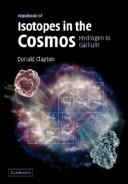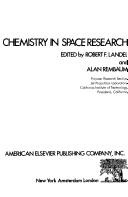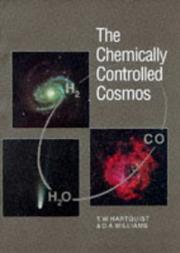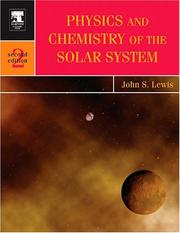| Listing 1 - 10 of 40 | << page >> |
Sort by
|
Book
ISBN: 9780521878623 0521878624 9780511804502 9780511729683 0511729685 0511726392 9780511726392 0511804504 1107210925 0511847017 1282631381 9786612631382 0511728735 0511724977 051172778X Year: 2010 Publisher: Cambridge University press
Abstract | Keywords | Export | Availability | Bookmark
 Loading...
Loading...Choose an application
- Reference Manager
- EndNote
- RefWorks (Direct export to RefWorks)
"How did the Solar System's chemical composition evolve? This textbook provides the answers in the first interdisciplinary introduction to cosmochemistry. It makes this exciting and evolving field accessible to undergraduate and graduate students from a range of backgrounds, including geology, chemistry, astronomy and physics. The authors - two established leaders who have pioneered developments in the field - provide a complete background to cosmochemical processes and discoveries, enabling students outside geochemistry to understand and explore the Solar System's composition. Topics covered include: - synthesis of nuclides in stars - partitioning of elements between solids, liquids and gas in the solar nebula - overviews of the chemistry of extraterrestrial materials - isotopic tools used to investigate processes such as planet accretion and element fractionation - chronology of the early Solar System - geochemical exploration of planets Boxes provide basic definitions and mini-courses in mineralogy, organic chemistry, and other essential background information for students. Review questions and additional reading for each chapter encourage students to explore cosmochemistry further"--Provided by publisher.
Cosmochemistry. --- Cosmochimie --- Cosmochemistry --- Astrochemistry --- Cosmic chemistry --- Space chemistry --- Chemistry --- Space sciences --- Chemistry. --- Physical sciences
Periodical
ISSN: 18729134 08832927 Year: 1986 Publisher: [Oxford ; New York] : Pergamon
Abstract | Keywords | Export | Availability | Bookmark
 Loading...
Loading...Choose an application
- Reference Manager
- EndNote
- RefWorks (Direct export to RefWorks)
Geochemistry --- Cosmochemistry --- JEX20 --- Astrochemistry --- Cosmic chemistry --- Space chemistry --- Chemistry --- Space sciences --- Environmental geochemistry. --- Environmental geochemistry

ISBN: 1316085910 1282486551 9786612486555 0511673841 0511675038 0511671784 0511670508 0511673051 9780511673054 9780511675034 9780511671784 0521823811 9780521530835 9780521823814 9781316085912 9781282486553 6612486554 9780511673849 9780511670503 Year: 2003 Publisher: Leiden Cambridge University Press
Abstract | Keywords | Export | Availability | Bookmark
 Loading...
Loading...Choose an application
- Reference Manager
- EndNote
- RefWorks (Direct export to RefWorks)
An information resource about the isotopes and their place in the cosmos.
Cosmochemistry. --- Isotopes. --- Nucleosynthesis. --- Nucleogenesis --- Chemical elements --- Cosmochemistry --- Nuclides --- Astrochemistry --- Cosmic chemistry --- Space chemistry --- Chemistry --- Space sciences
Book
ISBN: 9780323957182 9780323957175 0323957188 Year: 2023 Publisher: Amsterdam, Netherlands ; Oxford, England ; Cambridge, Massachusetts : Elsevier,
Abstract | Keywords | Export | Availability | Bookmark
 Loading...
Loading...Choose an application
- Reference Manager
- EndNote
- RefWorks (Direct export to RefWorks)
Cosmochemistry. --- Planets --- Water. --- Planetary water --- Water --- Astrochemistry --- Cosmic chemistry --- Space chemistry --- Chemistry --- Space sciences

ISBN: 0444001182 Year: 1972 Publisher: New York American Elsevier Publishing Comp. Inc
Abstract | Keywords | Export | Availability | Bookmark
 Loading...
Loading...Choose an application
- Reference Manager
- EndNote
- RefWorks (Direct export to RefWorks)
Cosmochemistry. --- Propellants. --- Space vehicles --- Materials. --- Cosmochemistry --- Propellants --- Astrochemistry --- Cosmic chemistry --- Space chemistry --- Materials --- Combustion --- Explosives --- Chemistry --- Space sciences
Book
ISBN: 0792318242 0792318250 9401127611 Year: 1991 Publisher: Dordrecht Kluwer
Abstract | Keywords | Export | Availability | Bookmark
 Loading...
Loading...Choose an application
- Reference Manager
- EndNote
- RefWorks (Direct export to RefWorks)
52 <063> --- Cosmochemistry --- -Astrochemistry --- Cosmic chemistry --- Space chemistry --- Chemistry --- Space sciences --- Astronomie. Astrofysica. Ruimteonderzoek. Geodesie--Congressen --- Congresses --- Cosmochemistry - Congresses. --- Cosmochimie.

ISBN: 0521419832 9780521419833 Year: 1995 Publisher: Cambridge Cambridge University press
Abstract | Keywords | Export | Availability | Bookmark
 Loading...
Loading...Choose an application
- Reference Manager
- EndNote
- RefWorks (Direct export to RefWorks)
Molecules in the early Universe acted as natural temperature regulators, keeping the primordial gas cool and, in turn, allowing galaxies and stars to be born. Even now, such similarly simple chemistry continues to control a wide variety of the exotic objects that populate our cosmos. What are the tools of the trade for the cosmic chemist? What can they teach us about the Universe we live in? These are the questions answered in this engaging and informative guide, The Chemically Controlled Cosmos. In clear, non-technical terms, and without formal mathematics, we learn how to study and understand the behaviour of molecules in a host of astronomical situations. We study the secretive formation of stars deep within interstellar clouds, the origin of our own Solar System, the cataclysmic deaths of many massive stars that explode as supernovae, and the hearts of active galactic nuclei, the most powerful objects in the Universe. We are given an accessible introduction to a wealth of astrophysics, and an understanding of how cosmic chemistry facilitates the investigation of many of the most exciting questions concerning astronomy today.
Cosmochemistry --- Molecules --- 521.03 --- Astrochemistry --- Cosmic chemistry --- Space chemistry --- Chemistry --- Space sciences --- Theoretical astronomy. Celestial mechanics--?.03 --- Cosmochemistry. --- Molecules. --- 521.03 Theoretical astronomy. Celestial mechanics--?.03

ISBN: 128096166X 9786610961665 0080470122 012446744X 9780080470122 9781483214139 1483214133 6610961662 9780124467446 Year: 2004 Publisher: Amsterdam Boston Elsevier Academic Press
Abstract | Keywords | Export | Availability | Bookmark
 Loading...
Loading...Choose an application
- Reference Manager
- EndNote
- RefWorks (Direct export to RefWorks)
Physics and Chemistry of the Solar System, 2nd Edition, is a comprehensive survey of the planetary physics and physical chemistry of our own solar system. It covers current research in these areas and the planetary sciences that have benefited from both earth-based and spacecraft-based experimentation. These experiments form the basis of this encyclopedic reference, which skillfully fuses synthesis and explanation. Detailed chapters review each of the major planetary bodies as well as asteroids, comets, and other small orbitals. Astronomers, physicists, and planetary scientists
Planetology. --- Astrophysics. --- Cosmochemistry. --- Solar system. --- Astrochemistry --- Cosmic chemistry --- Space chemistry --- Astronomical physics --- Planetary sciences --- Planetology --- Chemistry --- Space sciences --- Astronomy --- Cosmic physics --- Physics --- Milky Way
Book
ISBN: 9780521840309 0521840309 9780511812170 9780521549561 9781139129138 1139129139 9780511506512 0511506511 9780511504372 0511504373 0511812175 1107195500 1283329654 9786613329653 1139134167 113913082X Year: 2009 Publisher: Cambridge Cambridge University Press
Abstract | Keywords | Export | Availability | Bookmark
 Loading...
Loading...Choose an application
- Reference Manager
- EndNote
- RefWorks (Direct export to RefWorks)
The distribution of elements in the cosmos is the result of many processes, and it provides a powerful tool to study the Big Bang, the density of baryonic matter, nucleosynthesis and the formation and evolution of stars and galaxies. Covering many exciting topics in astrophysics and cosmology, this textbook, by a pioneer of the field, provides a lucid and wide-ranging introduction to the interdisciplinary subject of galactic chemical evolution for advanced undergraduates and graduate students. It is also an authoritative overview for researchers and professional scientists. This new edition includes results from recent space missions and new material on abundances from stellar populations, nebular analysis, and meteoric isotopic anomalies, and abundance analysis of X-ray gas. Simple derivations for key results are provided, together with problems and helpful solution hints, enabling the student to develop an understanding of results from numerical models and real observations.
Galaxies --- Cosmochemistry --- Evolution --- Cosmochemistry. --- Galactic evolution --- Galaxy evolution --- Galaxy mergers --- Astrochemistry --- Cosmic chemistry --- Space chemistry --- Chemistry --- Space sciences --- Evolution. --- Formation --- Galaxies - Evolution
Book
ISBN: 9780511674662 9780521517720 9781107629424 9780511675409 0511675402 9780511672156 0511672152 1107206782 1282546961 9786612546969 051167421X 0511670877 051167466X 0511673426 Year: 2010 Publisher: Cambridge Cambridge University Press
Abstract | Keywords | Export | Availability | Bookmark
 Loading...
Loading...Choose an application
- Reference Manager
- EndNote
- RefWorks (Direct export to RefWorks)
Planet formation studies uniquely benefit from three disciplines: astronomical observations of extrasolar planet-forming disks, analysis of material from the early Solar System, and laboratory astrophysics experiments. Pre-planetary solids, fine dust, and chondritic components are central elements linking these studies. This book is the first comprehensive overview of planet formation, in which astronomers, cosmochemists, and laboratory astrophysicists jointly discuss the latest insights from the Spitzer and Hubble space telescopes, new interferometers, space missions including Stardust and Deep Impact, and laboratory techniques. Following the evolution of solids from their genesis through protoplanetary disks to rocky planets, the book discusses in detail how the latest results from these disciplines fit into a coherent picture. This volume provides a clear introduction and valuable reference for students and researchers in astronomy, cosmochemistry, laboratory astrophysics, and planetary sciences.
Cosmic dust. --- Protoplanetary disks. --- Cosmochemistry. --- Astrochemistry --- Cosmic chemistry --- Space chemistry --- Chemistry --- Space sciences --- Accretion (Astrophysics) --- Dust --- Interstellar matter --- Solar system --- Origin.
| Listing 1 - 10 of 40 | << page >> |
Sort by
|

 Search
Search Feedback
Feedback About UniCat
About UniCat  Help
Help News
News